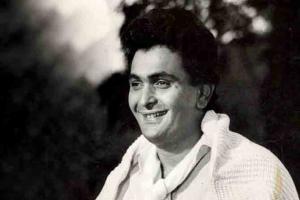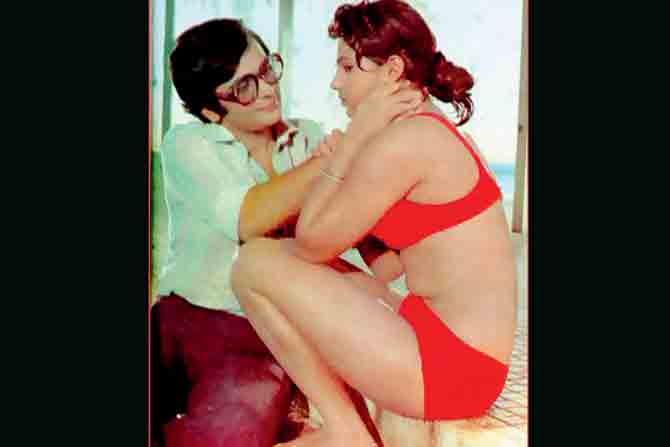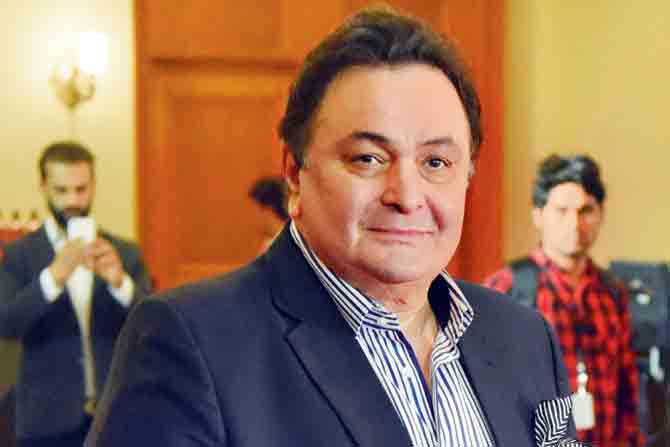Rishi Kapoor took stage-exit, just as he'd dived headlong into the most eclectic stage of his career!

Rishi Kapoor
Actor Rishi Kapoor died young, at 67. If he'd passed on few decades later, he would've still died young. And I don't mean that cliché about being 'young at heart' and all. I mean, literally, young in the head—where it counts.
Think he was between 25 to 30 years old; tops. This infused into his natural persona that casual aliveness of late youth—he's the guy you could chill at the corner-bar with, all through a party, as I did, couple of times. Feel blessed.
It also made him impulsive, tad impatient, moody, on occasion; unreasonable, even. Not an easy man to know and walk around, without care. Also he was therefore (mentally) a decade younger to me, and so there arose the minor/moral dilemma over what to call him! He didn't like Mr Kapoor ("Waddyathink, am an uncle or what?"). Rishiji wouldn't cut it. He preferred Rishi. I carried on with Mr Kapoor.
In the hierarchy of naam-karan (naming ceremony) in Indian popular culture, the apex of the pyramid belongs to the person the public bestows upon a common nickname, short-form, or epithet. It's not so much a mark of honour as it denotes the level of familiarity the public feels with a public figure!
This cuts across professions. It is most common in films—whether that be Shahenshah or Big B for Amitabh Bachchan; or Baadshah, King Of Romance, King Khan or SRK for Shah Rukh Khan. Tells you something about their image too.
Rishi went by the short, cute sobriquet, Chintu, at best, Chintuji—eternally that boy, at any rate India's first 'chocolate hero', who debuted as the National Award winning child-star of Raj Kapoor's magnum opus, Mera Naam Joker (MNJ; 1970). In fact, if you observed him closely, when he spoke with that impish smile—he still had a sweetly chubby face—it was quite easy to transpose him into the little Raju, besotted by his teacher Mary (Simi Garewal), from MNJ.
Thereafter he held a list of firsts for Bollywood that may not occur to you instantly, if I don't bring them to mind here. For one, up until Rishi's debut as the lead actor in Bobby (1973), he told me, Bollywood's heroes and heroines used to be men and women—holding books and going to college in their 30s and 40s! It's true. Rishi was 21; his leading lady, Dimple Kapadia, after whose character the film is titled, was 16.
While Bobby gave birth to a super-hit romantic pair, Dimple got married, and quit movies altogether. This posed a peculiar problem for Rishi. He was left to swim around a leading ladies' pool—Zeenat Aman, Parveen Babi, etc—that was considerably older, and therefore unfit to be cast as his conventional, romantic leads. There was Neetu Singh, absolutely his perfect onscreen better-half— later his off-screen wife. "But then, how many films could I do with her? So it had to be Neetu, or a new girl," he said.
Don't know if such an entry is allowed into the Guinness book, Rishi held the glorious record of introducing 23 female leads as his on-screen partner in the movies. And even that number he wasn't sure about. Besides that he wished to add even Alia Bhatt (Student Of The Year; 2012), Taapsee Pannu (Chashme Buddoor; 2013), into the list, since they had debuted in Bollywood with him, although he wasn't the lead in those movies.
Did he even remember all those 23 heroines he worked with; was he in touch with any of them? "Don't know where's Kajal Kiran (Hum Kisise Kum Naheen; 1977), Shoma Anand (Barood; 1976), Bhavana Bhatt (Naya Daur; 1978)…" Gah! Would've been a great idea to click Rishi seated in the centre as the good old Casanova surrounded by his debuting leading ladies — an eclectic array, almost stacked up like sardines — to celebrate 50 years of his debut, which falls on September 28, 2020.

Bobby (1973)
A mart is really how the movie business/trade has traditionally perceived itself — setting a price for what sells, and a sell-by-date for what doesn't. This is as true for stars as the image or genres associated with them. In that sense Rishi, although he liked to call himself the "right person at the wrong time", had an absolutely uninterrupted 25-year run at the movies — between 1973 and 1998 (averaging around five to six films a year) — which for its time is also a record of sorts: "Shelf life for a hero then was 20 years; 10 years for heroines."
He said the reason to quit films was also his. He had just got bored of the proverbial dancing around trees. Nothing exciting seemed to exist in the horizon. And so one fine day, he rounded up the four to five producers he owed advances to, and simply returned them their money.
This is when Rishi was 46. Shammi Kapoor, Rishi's uncle, and the seminal singing-dancing star of the generation he took over from, had retired at 37. Amitabh Bachchan, Rishi's older contemporary, left films (to return only much later) at 40. Of course none of these age restrictions/rules for retirement matter anymore. Shah Rukh Khan, 54, has currently taken a break to recalibrate his leading man's career.
Note: I mention Shahenshah, and Badshah or King Of Romance, again! This is because in the pantheon of Bollywood stars, Rishi saw himself sandwiched between the two: "I should've entered films in the '90s," he said. The year of Rishi's debut, 1973, is also when Prakash Mehra's Zanjeer proclaimed Amitabh Bachchan as the 'angry young man'— simultaneously killing that flowery phase of Rajesh Khanna romances; and gently pricking at the bud the romantic Rishi Kapoor from coming into full-potential, glorious bloom.
At the box office, Rishi, in many ways, would've been Rajesh Khanna's natural successor. In terms of a female fan-following, he sort of already was — with hordes of women, by his own account, taking their clothes off, so he could autograph their bras! And special 'Bobby buses', matched with theatre timings, plying between Punjab, Faridabad and (what was then) Gurgaon, so people from far-off towns could catch his first film.
Except the phase that followed, especially in the '80s, was full of, as he put it, "B and C centre maar-peet; Lahu Ke Khoon [both mean blood] kind of films, and some skin-show. The ambience, mahaul, was only for action." Rishi, on the other hand, had been secure enough in his masculinity to go drag with Rafoo Chakkar (1975). One such "totally wahiyaat (crappy)" film, he told me about, was called Hawalaat (1987), where he starred alongside the 'action types', Mithun Chakraborty and Shatrughan Sinha. He was of course the "guitar and dafli playing type." When it came to promoting the film, the producer asked him "to pose with a chaku (knife)" for the poster, to draw in audiences!
It is in this backdrop that one has to register the fact that Subhash Ghai's cracker musical Karz (1980) had tanked at the box-office. Ghai recently sold its remake rights for Rs. 3 crore, which is a sum he'd not even come close to with the original. Likewise, Rishi's Tina Munim, Poonam Dhillon, Rakhee Gulzar co-starrer, Yeh Vaada Raha (1982), based on Danielle Steele's novel The Promise, showed no promise either. Neither did Zehreela Insaan (1974). Nor was Ramesh Sippy (1985) quite the Sholay!
The above is merely a short Spotify playlist I'm making for you, so after you're through with the Hum Kisise Kum Naheen medley, you check out the opening riffs of Karz's Ek Hasina Thi, the title track of Yeh Vaada Raha, and the finest RD Burman number, O Hansini, from Zehreela Insaan, or O' Maria from Saagar. These soundtracks have been around us all along. Post Rajesh Khanna, RD arguably equalled Rishi, on screen. RD is very much alive. So will Rishi. Music is the medium through which Hindi movies survive public memory.
Also, only a proper desi film aesthete would be able to tell how Rishi was uniquely gifted at lip-syncing, to perfectly own a song, before the camera. It's called song-acting—a talent that has no use in any another film culture. The first time Rishi was asked to perform a track (Main shayar toh nahin, from Bobby), he recalled, his father, Raj Kapoor, allowed him no choreographer. The logic being the choreographer would give him steps that other stars had already performed to. He would automatically be compared to them!
Even as an actor, it can be argued, Rishi looked and behaved like no one else—of his time, or from the generations before. Let alone other Kapoors. None of whom seemed like shadows of each other — carving niches of their own — while being raised under the banyan tree of Prithviraj, a full-time theatre and later film-studio actor, who began a four-generational legacy that Rishi was a proud and aware progeny of.
Contrary to popular perception — mainly because so many get to take a shot at stardom in the first place — most superstar-kids don't make it in the movies. Comparisons do them in. What separated Rishi from his father Raj, for one, was the lack of being — a word he used himself — the "stylised" actor.
By which you mean certain tics, manners, or andaaz, as it were, that instantly marked out say Dilip Kumar, Raj Kapoor, Dev Anand, and others. Rishi didn't have that. And this is what made his return to "character-driven" or more realistic films, at a larger stage, easily possible. Which wasn't the case with most others before him. It's the lightheartedness of his films that rendered him an underrated actor—hardly ever taken seriously by the critical establishment; something that bothered him much. He told me comedian Johnny Lever had a bone to pick with him. Rishi was the only star who'd been around for so long, that Lever couldn't find a way to mimic on stage! Fair point.
In 2017, I had the honour to host Rishi's first (and as yet only) retrospective of films at the Jagran Film Festival. From a filmography of over 150, we had to pick five. This was impossible. Going back and forth with his suggestions, we kept widening the quota. Until we reached a point that we could no longer accommodate more than eight films. And yet, how could MNJ be left out? We decided to play eight and half films in all—the half comprising Rishi's section from the three-part MNJ!
To be fair, an artiste/entertainer's self-perception should be at the core of his fan-base. And for this moment, don't care what Rishi Kapoor gems you've found — let's make it about the jeweller foremost. According to him, besides Karz and Bobby, Rishi's greatest works were—Habib Faisal's Do Dooni Char (2010), Raj Kapoor's Prem Rog (1982), Karan Malhotra's Agneepath (2012), Shakun Batra's Kapoor & Sons (2016), Manmohan Desai's Amar Akbar Anthony (1977), and Yash Chopra's Chandni (1989).
Notice his latent bias towards more recent releases. You can gauge the phase he was enjoying the most — placing his acting chops on display. It doesn't seem as if fate had mortally attacked a man who's young or old — just someone with such vitality and zest for life, that he was looking to soar. That's what hurts far more. Rishi had battled leukemia for two years.

The reason for his return to films, he told me, was a lovers' tiff of sorts that he'd had with his filmmaker buddy Rakesh Roshan, who'd pricked his ego with some loose talk about his career (or the lack of it). The expectedly emotional Rishi reasoned that he had retired from stardom, yes, but not from acting. He decided to stage a comeback — also to prove a point to Roshan, who, along with Jeetendra, Prem Chopra, and his Campion schoolmate, director Rahul Rawail, were known to be his close friends.
Basically the Rishi Kapoor I observed from a private quarter was no different from the Rishi Kapoor one experiences from a distance, in public. Meaning, what you saw is what you got. No overt agendas as such. This often cofounded political coteries on social media, with a lot of his tweets driving traffic to the Right, and then swerving conveniently to the Left-Liberal, as they say!
Guess if you've lived your adult life entirely in the public eye, you'll either always fake it, or just stop caring beyond a point. Of course he also had a socially well-connected, mature, adult side to him, with an eye on the lay of the land. But for the most part, it seemed, Rishi kept it real.
With personal disclaimers, he had no qualms admitting to the world he'd frickin' bought the Filmfare Award, for Bobby! He wrote it in his book, and explained further at an interview with me before a live audience. What're you gonna shame him for?
As a Bollywood star, he didn't think twice before drunk-dialing me past midnight, referring to how I had obliquely compared his son Ranbir's performance in Rockstar (2011) to Amitabh Bachchan, Aamir Khan, Hrithik Roshan — "Abey, beta toh mera hai!" True.
He could get childishly excited even about wearing a delegate-badge at a film festival, given that he said, surprisingly (for me), he'd never been formally invited to one before. But then again, despite his first and only retrospective being held across 16 cities over three months, he could bail out a day before the all-important closing ceremony, for a conversation before a packed house.
Because? He had an issue with an absolutely random cartoon published in Mid-day, about the fire at RK Studio. No, you couldn't console him. Just couldn't. That was Rishi. His friends say the same. Everyone loved him just the way he was though. Good luck God. And thank you, Mr Kapoor.
Catch up on all the latest entertainment news and gossip here. Also, download the new mid-day Android and iOS apps.
Mid-Day is now on Telegram. Click here to join our channel (@middayinfomedialtd) and stay updated with the latest news
 Subscribe today by clicking the link and stay updated with the latest news!" Click here!
Subscribe today by clicking the link and stay updated with the latest news!" Click here!









